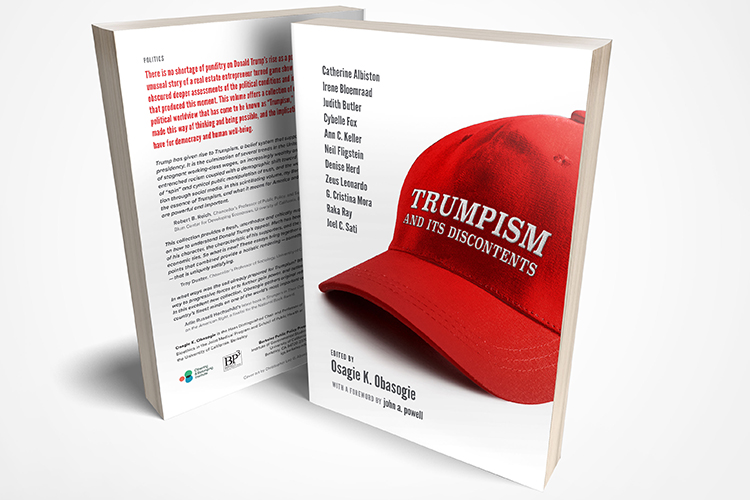Trump lost, but his brand of politics may be here to stay
UC Berkeley scholars compile book of essays that examine the divisions that came in the wake of Trump's presidency.
November 17, 2020

Donald Trump speaks to his supporters at a campaign rally in Fountain Hills, Arizona, a state he lost in the 2020 election. (Photo by Gage Skidmore/Flickr)
President Donald Trump lost the 2020 election, but the rhetoric and division that fueled his campaign and presidency did not magically disappear when news agencies declared former Vice President Joseph Biden the president-elect.
In the newly released book of essays “Trumpism and its Discontents,” UC Berkeley experts draw upon the tools of their respective fields of research to put Trump and his brand of politics — described as an opposition to democratic norms fueled by self-interest — into greater context.

Osagie K. Obasogie is the UC Berkeley Haas Distinguished Chair and Professor of Bioethics in the Joint Medical Program and School of Public Health. (UC Berkeley photo)
“Part of Trumpism is this appeal that traditional ideals in America are somehow being thwarted by minority groups,” said Berkeley professor of bioethics Osagie K. Obasogie, who edited the volume compiled of contributions from 12 UC Berkeley faculty members and one student. “This fuels many of the damaging policies put forth by the Trump Administration over the past four years regarding immigration, race relations and the economy. The misguided thought process behind Trumpism manipulates and exacerbates an existing sense of loss that many Americans feel.”
The book, published online by Berkeley’s Othering and Belonging Institute for free download, covers disciplines including immigration, gun control, colonialism and race speech.
The project started four years ago, Obasogie said, after several Berkeley faculty members at the Othering and Belonging Institute began to think collectively of ways they could respond to what was a disturbing 2016 presidential election, and to examine what the implications of a Trump presidency meant for America.
Obasogie spoke with Berkeley News recently about the impact of social media in disseminating divisive political rhetoric, and the steps a new administration could take to sow the seeds of unity in a polarized electorate.
Berkeley News: What is Trumpism?
Osagie Obasogie: Trumpism is hard to define, in part because it does not have a consistent set of principles or ideologies.
It’s an approach that is based upon the Administration’s self-interest. Trumpism is irreverent of democratic norms and does whatever is necessary to achieve goals that help Trump and his supporters maintain power. That, in part, is the authoritarian thread that concerns many people. Democratic norms become subservient to individual impulses.
We should be wary of this style of politics, which can and has become toxic when mixed with Trump’s celebrity factor.

Trumpism and its Discontents helps to contextualize the reasons for Donald Trump’s rise in American politics, and his appeal to nearly half of the voting populace.
From this year’s election we see that Trumpism appealed to over 70 million American voters. Will this book help contextualize why they voted for Trump?
The edited volume will help people understand some of the broad dynamics that allowed Trumpism to resonate with so many people, gave rise to Trump’s 2016 election, and led to a closer than expected yet failed re-election campaign. We tend to think about Trumpism as being driven by a particular “type” of person who we see acting exuberantly at televised Trump rallies or on social media clips.
While pollsters and the media tend to focus on males without college degrees or suburban housewives, we have to understand that it took a coalition of people to put Trump into office. This wasn’t one singular demographic of supporters in rural America. A lot of wealthy people voted for Trump. A lot of people living in urban areas voted for Trump. So, we have to understand Trumpism as a coalitional project that affirms a certain way of thinking about the world.
Trumpism has appeal across a wide range of people, in terms of background, education and employment who resist progressive policies and want to preserve the status quo. This volume of essays is an attempt to put that appeal into a broader context, and to understand its implications.
While voters in this election didn’t show the repudiation of Trump that some thought they would, Joe Biden has been declared president-elect. Trump lost. When he leaves the White House, will Trumpism be dead?
In short, no. The legacy of Trump will continue to be with us for quite some time as a style of politics that’s based on an unapologetic appeal to disrupting institutional norms as a way to justify policies that promote othering and resist greater social inclusion.
Part of the work that the Biden administration will have is to demonstrate once again that America is a diverse place and that we can productively live together. President-elect Biden can use this moment as a way to strengthen our democracy so that it can withstand ongoing and future attempts to dismantle it.
… we have to understand that it took a coalition of people to put Trump into office. This wasn’t one singular demographic of supporters in rural America.”
– Osagie Obasogie
Could the vestiges of Trumpism be utilized by someone who is part of the Trump family? Could someone else seize Trump’s support by using the same type of politics?
I think the GOP will try to maintain the base that Trump has created, but it’s unclear whether that base will follow. Much of Trump’s appeal is his celebrity. It’s unclear whether one of his own family members can continue this when they don’t have that status. At least not yet.
Continued civic engagement is required to prevent Trumpism from rising again. We should be excited by the sheer number of people who voted in the 2020 election.
Hopefully, these numbers mean that we brought a new generation of voters to the polls who will continue to engage with political issues and become more active in their own communities.
President-elect Biden, in a recent speech, mentioned lofty goals of uniting people after four years of extreme division. If Biden read this book, would it help him achieve this?
I believe so. This edited volume provides needed context and nuance that has been missing from public discourse.
In many ways you can view the book as a postmortem, or an assessment of how Trumpism emerged, ascended, and became a fixture in American politics.
From that perspective, it can help us understand how and why that occurred, and how we can prevent that from occurring again.

During a press conference at the White House on Nov. 5, Trump charged — without evidence — that the election was tainted by fraud that was handing victory to Democrat Joe Biden. Thousands of his supporters reiterated this message, at a “Stop the Steal” rally in Washington D.C. this past weekend. (AP Photo/Evan Vucci)
Why did Trump’s message resonate with so many people, and, in turn, divide the country?
I think it’s fair to say that Trump would not have been able to come to power without Twitter and other forms of social media. And, with that, he was able to exacerbate existing social divisions to create a false reality based upon grievance and blaming dwindling economic opportunities for some on the inclusion of others.
Political disinformation has been around for hundreds of years and was not created by social media. However, what makes social media in the era of Trump dangerous to democracy is the ability to transmit information and connect otherwise isolated populations who have warped senses of reality so that they feel that their harmful rhetoric and baseless claims are part of a legitimate community with legitimate grievances toward government and minority groups.
Facebook and Twitter played a more active role in identifying misinformation during the 2020 election — that is an important first step.
As we transition to a new administration, we have to have deep conversations about social responsibility and technology and understand that we can’t simply rely on individual social media users to figure out what’s true and what’s not. Social media platforms have to take greater responsibility to protect democracy.
We’ll always have folks on different points of the political spectrum that disagree on how to best approach the problems that we face. Disagreement and difference can be healthy and productive as we come to a shared goal of improving our society.
However, in order to do that, we have to all work from a basic understanding about what reality entails. From there, we can come together and decide how to best move forward.